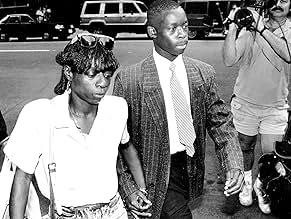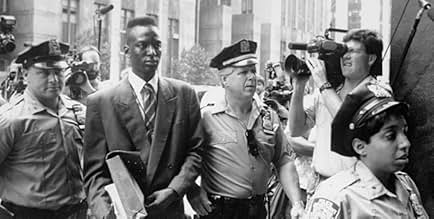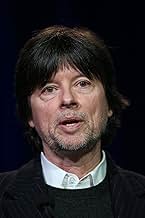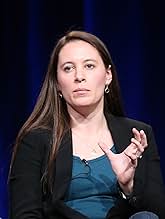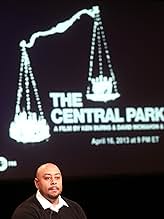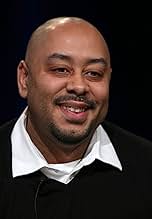PUNTUACIÓN EN IMDb
7,7/10
8,2 mil
TU PUNTUACIÓN
Sobre el caso de 5 adolescentes de afroamericanos y latinos quienes pasaron entre 6 y 13 años en prisión por una violación que no cometieron.Sobre el caso de 5 adolescentes de afroamericanos y latinos quienes pasaron entre 6 y 13 años en prisión por una violación que no cometieron.Sobre el caso de 5 adolescentes de afroamericanos y latinos quienes pasaron entre 6 y 13 años en prisión por una violación que no cometieron.
- Dirección
- Guión
- Reparto principal
- Premios
- 10 premios y 18 nominaciones en total
Kharey Wise
- Self - Wrongfully Convicted
- (as Korey Wise)
Matias Reyes
- Self - Confessed Rapist
- (metraje de archivo)
- (sonido de archivo)
Calvin O. Butts III
- Self - Reverend
- (as Rev. Calvin Butts)
Reseñas destacadas
The documentary is well polished. And it proves the professionalism of the production team. But it is dull. And all the accents are missing. The whole film is something done to get cookie points from someone.
It starts with the populist statement about the rich of New York. The whole first part has no connection with the case. Just a "see, we're all for social justice" or something. In the end, the whole production is about not upsetting anyone. Yes, the case was badly handled. And there is racial polarization present in all footage. But the production team does not have the guts to say it it was about race. Also, not a word the whole movie about the leeches in the Police and DA. Only the last five minutes a mild talk, even more diluted with talk about "the press". How about when they had a positive identification of the DNA evidence and the bureaucrats become very scrupulous and started an investigation. Which meant more prison time for the victims and more money spent from the tax payer. There is only one slide about the civil suit brought by the Five against the governmental workers that handled the case. Nothing about the generous pension plans and impeccable record of the judge, district attorneys, policemen.
Nothing that could upset anyone while getting the most about being heroes talking about a 20 year old case. A perfect case of exploitation of somebody's pain for personal gain.
It starts with the populist statement about the rich of New York. The whole first part has no connection with the case. Just a "see, we're all for social justice" or something. In the end, the whole production is about not upsetting anyone. Yes, the case was badly handled. And there is racial polarization present in all footage. But the production team does not have the guts to say it it was about race. Also, not a word the whole movie about the leeches in the Police and DA. Only the last five minutes a mild talk, even more diluted with talk about "the press". How about when they had a positive identification of the DNA evidence and the bureaucrats become very scrupulous and started an investigation. Which meant more prison time for the victims and more money spent from the tax payer. There is only one slide about the civil suit brought by the Five against the governmental workers that handled the case. Nothing about the generous pension plans and impeccable record of the judge, district attorneys, policemen.
Nothing that could upset anyone while getting the most about being heroes talking about a 20 year old case. A perfect case of exploitation of somebody's pain for personal gain.
I remember the skeptical tone of one news report I read in 2002, when the Central Park Five ("CP5") were exonerated due to Matias Reyes's confession to the 1989 assault and rape of Trisha Meili. The majority of people (including myself) who gave the story a cursory glance seemed doubtful about a serial rapist who was already serving a life sentence--i.e., with nothing left to lose by making a false confession--meeting one of the CP5 by chance in prison and taking the blame in order to clear the names of several young men who must have been properly convicted some years earlier. "What did Reyes get in return?" many of us wondered, ignoring the facts that all of the CP5 had already completed their sentences for the rape and near-murder of Meili--though one of them was incarcerated for a later drug trafficking offense and just happened to meet Reyes in prison--and that Reyes's DNA matched the profile found at the crime scene.
THE CENTRAL PARK FIVE is very important in showing the other side of the story. It definitely has its slant, as any documentary will, but it makes a strong argument for the basic fact that five teenaged boys were convicted solely because of coerced and contradictory confessions to the crime after hours of being interrogated and played off against one another with a complete disregard for the lack of direct evidence against them. It clearly shows how this can and does happen far more often than many of us want to think. It's also very revealing of how dangerous public emotion and outrage, regardless of its focus, can be.
Unfortunately, the NYPD, the prosecutors in the case, and everyone else responsible for the convictions declined to speak to Directors Ken and Sarah Burns, which is very telling but also limits the scope of the film. THE CENTRAL PARK FIVE is dominated by interviews with the CP5 and their relatives, obviously a crucial ingredient, but it becomes repetitive. There are, however, important comments from then-Mayor Ed Koch, who was all for conviction and serious punishment of the CP5 in 1989 but has now apparently changed his mind. The brief input by NYC historian Craig Steven Wilder and several others also adds a great deal.
One of the strongest aspects of THE CENTRAL PARK FIVE is the brief sociological perspective of New York City's racially polarized, have/have-not environment during the 1970s and 80s. Not only is it elucidating in its own right, it also provides background and something in the way of explanation for the wrongful conviction of the CP5.
Some of the more negative reviews have criticized THE CENTRAL PARK FIVE simply for being "boring," and at the risk of sounding crass, I see what they mean. While this is an important miscarriage of justice that should not be ignored, the repetitiveness and narrow scope of the film will inevitably limit its mass appeal. Anyone with a serious interest in this case and wrongful convictions in general, however, will probably find its two-hour length well-worth sitting through.
More analysis of the details that led to the wrongful convictions would have been helpful, e.g., the term "wilding." One of the CP5 confessed to police that he and a number of others were "wilding" in Central Park on the night of the crime. The term "wilding" is roughly equivalent to "raising hell," the usual term-of-choice when I was a kid in the late '70s/early '80s. "Raising hell" could, of course, refer to anything from driving fast, drinking beer, and talking loudly and irreverently (as we meant it) to violent felonies. More discussion of how misinterpretations of the loose term "wilding" were a critical factor in the conviction would have added some depth to this documentary.
THE CENTRAL PARK FIVE is very important in showing the other side of the story. It definitely has its slant, as any documentary will, but it makes a strong argument for the basic fact that five teenaged boys were convicted solely because of coerced and contradictory confessions to the crime after hours of being interrogated and played off against one another with a complete disregard for the lack of direct evidence against them. It clearly shows how this can and does happen far more often than many of us want to think. It's also very revealing of how dangerous public emotion and outrage, regardless of its focus, can be.
Unfortunately, the NYPD, the prosecutors in the case, and everyone else responsible for the convictions declined to speak to Directors Ken and Sarah Burns, which is very telling but also limits the scope of the film. THE CENTRAL PARK FIVE is dominated by interviews with the CP5 and their relatives, obviously a crucial ingredient, but it becomes repetitive. There are, however, important comments from then-Mayor Ed Koch, who was all for conviction and serious punishment of the CP5 in 1989 but has now apparently changed his mind. The brief input by NYC historian Craig Steven Wilder and several others also adds a great deal.
One of the strongest aspects of THE CENTRAL PARK FIVE is the brief sociological perspective of New York City's racially polarized, have/have-not environment during the 1970s and 80s. Not only is it elucidating in its own right, it also provides background and something in the way of explanation for the wrongful conviction of the CP5.
Some of the more negative reviews have criticized THE CENTRAL PARK FIVE simply for being "boring," and at the risk of sounding crass, I see what they mean. While this is an important miscarriage of justice that should not be ignored, the repetitiveness and narrow scope of the film will inevitably limit its mass appeal. Anyone with a serious interest in this case and wrongful convictions in general, however, will probably find its two-hour length well-worth sitting through.
More analysis of the details that led to the wrongful convictions would have been helpful, e.g., the term "wilding." One of the CP5 confessed to police that he and a number of others were "wilding" in Central Park on the night of the crime. The term "wilding" is roughly equivalent to "raising hell," the usual term-of-choice when I was a kid in the late '70s/early '80s. "Raising hell" could, of course, refer to anything from driving fast, drinking beer, and talking loudly and irreverently (as we meant it) to violent felonies. More discussion of how misinterpretations of the loose term "wilding" were a critical factor in the conviction would have added some depth to this documentary.
Any story of justice denied, of people wrongfully imprisoned is inherently dramatic. But Ken Burns uses this case of five frightened teen aged boys prodded and manipulated into confessing to a crime they didn't commit to dig into some larger societal issues as well. Yes, the police and prosecutors look bad for the way they mislead the kids into confessions, and then steadfastly refuse to look at other evidence. But the press also comes off badly for exploiting the case to sell papers and satisfy a frightened city's desire for law and order, instead of asking questions when it became clear things simply weren't adding up. And politicians for expressing condemnation and outrage at these young men before they were even (wrongly) convicted. A strong and pointed warning about those times when society's desire for revenge overcomes it's sense of logic, humanity and fairness.
"Central Park Five" serves as a warning about legal incompetence, innocent lives destroyed, and a judicial system vulnerable to manipulation. The documentary details a nightmare scenario for five Harlem teenagers facing hard time, and the condemnation of America for a crime they didn't commit. The production sets the situation immediately, introducing the viewer to NYC in the 1980s, where Wall Street is in the process of rebuilding its reputation, while crack ravages the inner city, creating an explosive racial divide.
The film examines the infamous 1989 Central Park Jogger case, where a young white woman is brutally beaten and raped in New York's Central Park. At the same time, a group of five young black and Latino teenagers were quickly arrested for the crime and imprisoned. Following swift arrests by law enforcement officials, the prosecutors proudly declared the conviction as a step forward in the reclamation of a the city. Despite the lack of concrete evidence, all five are found guilty on multiple charges. Raymond Santana, Yusef Salaam, Antron McCray, Kevin Richardson, and Kharey Wise each spent between six to 13 years in prison, professing their innocence, while maintaining that it was a coerced confession to the crime. However, a chance encounter between the oldest of them and convicted serial rapist Matias Reyes, who years later yields his free admission of sole responsibility for the crime, and the claim is further substantiated with DNA evidence.
The documentary's approach seamlessly blends past and present, re-examines the assault, and walks you through what happened to the teenagers, from their arrest through their exoneration. Burns captures the complexity of history with startling results, yet "The Central Park Five" isn't quite as comprehensive as hoped, and fails to add anything substantively new to the story. Additionally, an element of balance is missing that would have turned a very good documentary into an exceptional one.
"The Central Park Five" presents the facts of the case with clarity, and it is a courageous, revealing look at the often complex and broken legal system in the United States. Unfortunately, there is no avoiding the conclusion presented by historian Craig Steven Wilder: "Rather than tying (the case) up in a bow and thinking that there was something we can take away from it, and that we'll be better people, I think what we really need to realize is that we're not very good people."
The film examines the infamous 1989 Central Park Jogger case, where a young white woman is brutally beaten and raped in New York's Central Park. At the same time, a group of five young black and Latino teenagers were quickly arrested for the crime and imprisoned. Following swift arrests by law enforcement officials, the prosecutors proudly declared the conviction as a step forward in the reclamation of a the city. Despite the lack of concrete evidence, all five are found guilty on multiple charges. Raymond Santana, Yusef Salaam, Antron McCray, Kevin Richardson, and Kharey Wise each spent between six to 13 years in prison, professing their innocence, while maintaining that it was a coerced confession to the crime. However, a chance encounter between the oldest of them and convicted serial rapist Matias Reyes, who years later yields his free admission of sole responsibility for the crime, and the claim is further substantiated with DNA evidence.
The documentary's approach seamlessly blends past and present, re-examines the assault, and walks you through what happened to the teenagers, from their arrest through their exoneration. Burns captures the complexity of history with startling results, yet "The Central Park Five" isn't quite as comprehensive as hoped, and fails to add anything substantively new to the story. Additionally, an element of balance is missing that would have turned a very good documentary into an exceptional one.
"The Central Park Five" presents the facts of the case with clarity, and it is a courageous, revealing look at the often complex and broken legal system in the United States. Unfortunately, there is no avoiding the conclusion presented by historian Craig Steven Wilder: "Rather than tying (the case) up in a bow and thinking that there was something we can take away from it, and that we'll be better people, I think what we really need to realize is that we're not very good people."
Korey,Ray Santana (and Ray's father) and the other Five are the stars of this documentary really. Their humanity and suffering is etched in their faces. The story of five innocent boys (14-16) railroaded into confessing to a crime they didn't commit by police and prosecutors that just wanted feathers in their cap must touch the heart of any parent of a teenage boy. That they are ever exonerated comes as a miracle--and has nothing to do with the justice system. Ray's father says it is literally the hand of God, and honestly, this is one of those things that makes you wonder! The best thing about the movie is the men themselves. The trouble is that for Mr. Burns it is all about the racial fault line between black and white. Does he think we don't have any dividing lines up here in NH? Has he noticed the trailer parks hidden behind pine trees? All white people, definitely divided. I lived in NYC in 1990, and there was another headline blaring then about a white mob killing an innocent black man. The prosecutors in that case were also falling all over themselves making political hay. A person reading the headlines in both cases (Bensonhurst and Central Park 5) would have their blood boiling within 3 seconds. Meanwhile, more and more people in NYC spoke Spanish, Hindi, Chinese. We actually all took the subways together and were often courteous to one another, trapped like sardines, while holding our tabloids which screamed headlines that suggested, "stick to your own kind." It was less and less about black and white, but the tabloids never got that, and Mr. Burns doesn't either. He's sort of a reverse tabloid. But Korey and Ray and Antron and Kevin and Yussef are extraordinary people, and I thank Mr. Burns and his daughter Sara for permitting us to know their story. And this is more complicated than anything Mr. Burns has made before, so everyone should see it.
¿Sabías que...?
- Citas
[last lines]
Antron McCray: The truth came out. Truth came out.
- ConexionesFeatured in Ken Burns: America's Storyteller (2017)
- Banda sonoraYo Slippin
Written by KRS-One
Published by Universal Music - Z Tunes LLC
Performed by Boogie Down Productions
Courtesy of RCA Records
By arrangement with Sony Music Licensing
Selecciones populares
Inicia sesión para calificar y añadir a tu lista para recibir recomendaciones personalizadas
- How long is The Central Park Five?Con tecnología de Alexa
Detalles
Taquilla
- Recaudación en Estados Unidos y Canadá
- 325.653 US$
- Fin de semana de estreno en EE. UU. y Canadá
- 30.570 US$
- 25 nov 2012
- Recaudación en todo el mundo
- 325.653 US$
- Duración
- 1h 59min(119 min)
- Color
- Mezcla de sonido
- Relación de aspecto
- 1.78 : 1
Contribuir a esta página
Sugerir un cambio o añadir el contenido que falta



